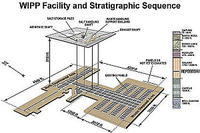-
Improving the aerodynamic design of B61-12 bomb
Sandia National Laboratories has finished eight days of testing a full-scale mock unit representing the aerodynamic characteristics of the B61-12 gravity bomb in a wind tunnel. The tests on the mock-up were done to establish the configuration that will deliver the necessary spin motion of the bomb during freefall and are an important milestone in the Life Extension Program to deliver a new version of the aging system, the B61-12.
-
-
Lt. Gen. Frank Klotz (Ret) confirmed as DoE undersecretary for nuclear security, NNSA administrator
Lieutenant General Frank G. Klotz, United States Air Force (Ret.), was confirmed by the Senate on Tuesday, 8 April 2014, as the Department of Energy’s undersecretary for nuclear security and administrator for the National Nuclear Security Administration (NNSA).
-
-
New consortium dedicated to developing nuclear arms control verification technologies
A consortium of thirteen universities and eight national laboratories, led by the University of Michigan and including the Los Alamos National Laboratory as a partner, has been awarded a $25 million grant by the NNSA. The consortium is dedicated to the research and development (R&D) of nuclear arms control verification technologies, including nuclear safeguards effectiveness.
-
-
New group formed to monitor Savannah River Site, nuclear waste issues in SE U.S.
Savannah River Site Watch (SRS Watch), a new public-interest watchdog group, was launched last week in what it said was a response to the need for increased monitoring of the nuclear projects carried out by the U.S. Department of Energy (DOE). The group says it has been formed to focus on an array of nuclear projects now underway at Savannah River Site (SRS), the sprawling 310-square mile complex located near Aiken, South Carolina.
-
-
Los Alamos National Lab resumes transuranic waste shipments

The waste was received at Waste Control Specialists in Andrews, Texas, where it will be temporarily staged until it can be shipped to the Waste Isolation Pilot Plant (WIPP) near Carlsbad, New Mexico for final disposal. WIPP has been closed since mid-February as a result of radiation leaks in underground storage tunnels. The shipments keep LANL on track to complete 3,706 Campaign on schedule. The campaign aims to remove 3,706 cubic meters of nuclear waste from LANL by 30 June 2014.
-
-
New center will work to improve methods to detect, prevent the spread of nuclear weapons
The National Nuclear Security Administration (NNSA) has awarded the University of Michigan $25 million to establish the Center for Verification Technology. A team from thirteen universities will work with eight national labs to analyze nuclear nonproliferation efforts, improve technologies for monitoring weapons-grade materials and detecting secret weapon tests, and train the next generation of nonproliferation experts.
-
-
Possibility of “dirty bombs” a major terrorism threat
The International Atomic Energy Agency (IAEA) has warned that there were 140 cases of missing or unauthorized nuclear and radioactive material in 2013 — a pressing reminder that the possibility of possession of nuclear materials by terrorist organizations is both real and current.
-
-
Obscure element shows promise for nuclear waste storage

One of the least known elements of the periodic table, californium, may hold the key to the safe and effective long-term storage of nuclear waste, according to new research. The researchers have demonstrated that californium (Cf) has an “amazing” ability to bond and separate other materials, as well as being extremely resistant to radiation damage.
-
-
New infrared technique remotely to detect dangerous materials
Researchers say that infrared technology holds the potential to spot from afar whether a site is being used to make nuclear weapons. They developed a model which precisely characterizes the material in each pixel of an image taken from a long-wave infrared camera. The U.S. National Nuclear Security Administration (NNSA) funded the project. The government’s long-term goal for infrared technology is remotely to detect the exact materials, chemicals and gases coming and going from factories or other sites suspected of illegal nuclear production.
-
-
S.C. sues DOE over Savanah River MOX facility
South Carolina decided to go to court to prevent the Obama administration from cutting off funding for a troubled multi-billion dollar Savanah River plant in which weapons-grade plutonium would be processed and turned into suitable fuel for commercial nuclear reactors. The initial budget for the MOX project, when it was launched a decade ago, was just under $4 billion. Since then, construction costs have reached $8 billion, and DOE officials now say the plant will cost about $30 billion over the years it is in use.
-
-
DOE: Contrary to rumor, there are no evacuation plans for southeastern New Mexico
The Department of Energy (DOE) said the other day that an Internet rumor which has been fueling concerns earlier this week about the need to be prepared to evacuate southeastern New Mexico because of recent events at the Waste Isolation Pilot Plant (WIPP) is “absolutely” without basis. DOE notes that monitoring conducted by Nuclear Waste Partnership of air, soil, water, and vegetation are showing no radiation releases that would approach levels causing health concerns.
-
-
IDF ordered to continue preparations for striking Iran’s nuclear sites this year
The negotiations between the P5+1 and Iran over Iran’s nuclear program continue, with an eye to replacing, by June, the current temporary agreement with a permanent one, but Israel let it be known that it is continuing to its preparations for a military strike on Iran’s nuclear facilities. Prime Minister Benjamin Netanyahu and Defense Minister Moshe Ya’alon have instructed the IDF to continue its preparations for carrying out such a strike, at a cost estimated to be at least ten billion shekels ($2.89 billion) this year.
-
-
S.C. politicians want decision to halt work on Savannah River plutonium plant reversed
Three Republican lawmakers from South Carolina — Senator Lindsey Graham and Representatives Tim Scott and Joe Wilson have – have asked South Carolina governor Nikki Haley to “explore any legal avenues” to prevent the mixed-oxide fuel (MOX) project at the Savannah River Sitefrom shutting down. The administration has decided to put the project on hold after repeated delays and cost overruns averaging 60 percent over the original estimates.
-
-
Loa Alamos lab has nowhere to send its nuclear waste
With the U.S. only underground nuclear waste repository shut down owing to radiation leaks, Los Alamos National Laboratory found itself facing a problem: it has to find an alternative place to ship toxic waste from a mesa on its northern New Mexico campus, and it has until June to do so. The problem is shared by other sites with nuclear waste. The fact that the repository has been shut down indefinitely means that soon nuclear waste will begin to backup ate various locations around the country where nuclear weapons-related activity is taking place.
-
-
Underground recovery process at WIPP begins
Nuclear Waste Partnership (NWP), the management and operations contractor at the Waste Isolation Pilot Plant (WIPP) for the U.S. Department of Energy (DOE), said it has initiated the first phase of an underground recovery process which will lead to the resumption of nuclear waste disposal operations at WIPP. Initial results show no airborne radioactive contamination in the underground shafts.
-
- All
- Regional
- Water
- Biometrics
- Borders/Immig
- Business
- Cybersecurity
- Detection
- Disasters
- Government
- Infrastructure
- International
- Public health
- Public Safety
- Communication interoperabillity
- Emergency services
- Emergency medical services
- Fire
- First response
- IEDs
- Law Enforcement
- Law Enforcement Technology
- Military technology
- Nonlethal weapons
- Nuclear weapons
- Personal protection equipment
- Police
- Notification /alert systems
- Situational awareness
- Weapons systems
- Sci-Tech
- Sector Reports
- Surveillance
- Transportation
Advertising & Marketing: advertise@newswirepubs.com
Editorial: editor@newswirepubs.com
General: info@newswirepubs.com
2010-2011 © News Wire Publications, LLC News Wire Publications, LLC
220 Old Country Road | Suite 200 | Mineola | New York | 11501
Permissions and Policies
Editorial: editor@newswirepubs.com
General: info@newswirepubs.com
2010-2011 © News Wire Publications, LLC News Wire Publications, LLC
220 Old Country Road | Suite 200 | Mineola | New York | 11501
Permissions and Policies
